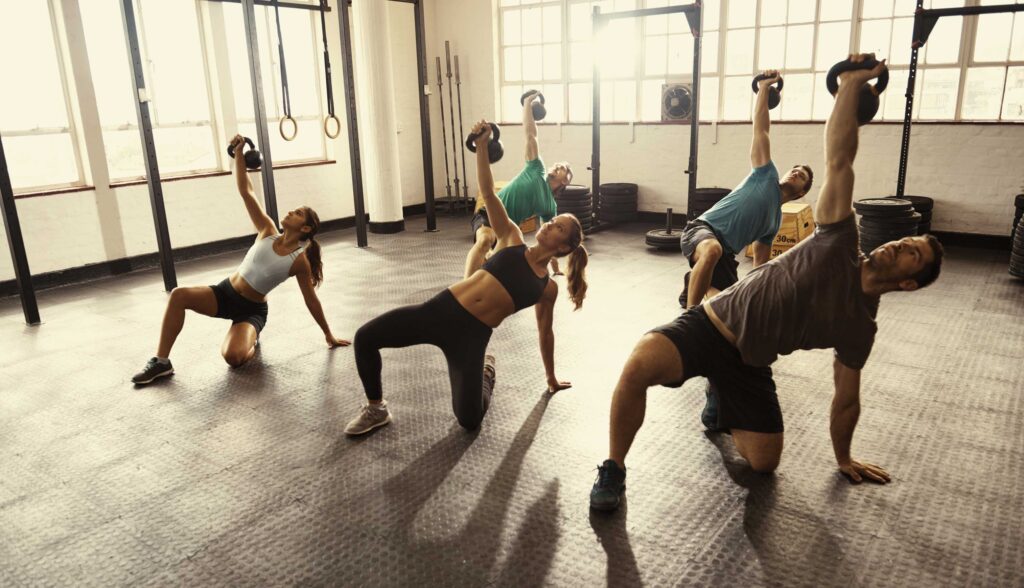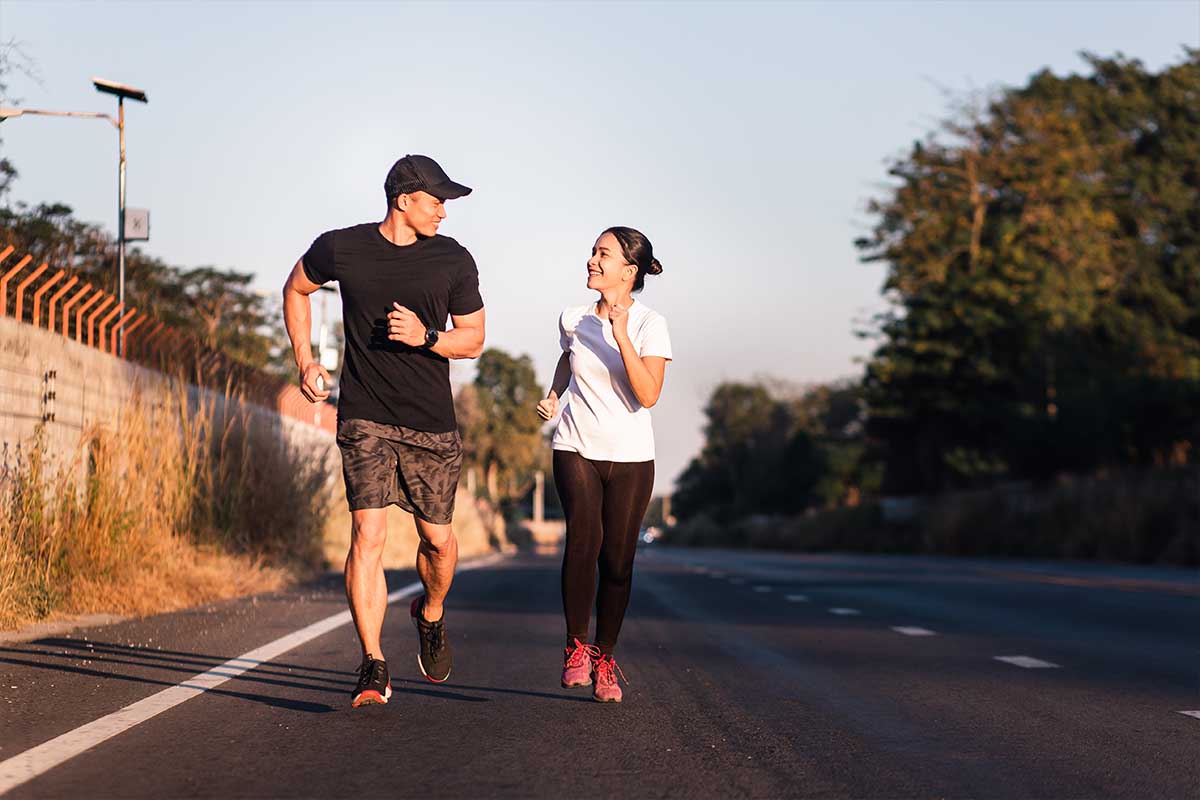Advertisement
Back to Fitness School
This season's must-try fitness classes

New types of fitness classes are opening all the time in gyms across Canada. Here are a few of the trendy, creative options you can enrol in today.
The benefits of group fitness
A class atmosphere creates a sense of social support and accountability so we’re more likely to stick to our exercise commitments.
Advertisement
Goodbye, gym equipment: try calisthenics
One of the year’s most popular new fitness class trends is body weight training, according to a worldwide study by the American College of Sports Medicine. Also known as calisthenics, each class uses little to no equipment and instead incorporates activities such as jumping jacks and burpees.
“Calisthenics creates a good foundation as it focuses on the basics,” says Vahin Gounden, owner of a calisthenics gym. “Since your body will rely on its base level of strength, anyone—regardless of your level of fitness—can perform these workouts.” He says it promotes lean muscle mass while increasing mobility, flexibility, and endurance.
The explosive movements in each class require a short burst of intense power. Eat fruit and other nutrient-dense carbohydrates 90 minutes or more before class to boost your muscles’ glycogen levels. Creatine supplements are thought to improve workout performance when we’re doing quick, high intensity movements.
Advertisement
Unleash your inner Rocky Balboa: try boxing
Boxing classes help us improve our endurance, get toned, and burn up to 1,000 calories in a single session, says personal trainer Marisa Demos. Don’t let the fighting theme intimidate you. “Think of it as a cardio workout,” she suggests. “Most classes consist of you hitting the bag [with] jabs, hooks, and combos according to what the instructor says.”
Punching is hard work. To fuel what we do in the ring, take a page from professional boxers: eat complex carbohydrates such as oatmeal and quinoa, plus healthy fats such as olive oil and nuts. Fish oil supplements may help reduce inflammation, muscle soreness, and stiffness after strenuous exercise.
Advertisement
A shore way to get stronger: try sand workouts
Outdoor beach weather is drawing to a close, but more gyms are letting us exercise indoors with a little sand between our toes. “Sand-based exercises [are] a more effective workout while remaining gentle on the joints,” says Minna Herskowitz, a personal trainer who owns a sandbox gym. She notes that sand’s soft, unstable surface and natural resistance force our muscles to work harder.
Any traditional workout can be done in a sandbox or beach fitness class. They’re especially popular with runners. “Sand makes it difficult to walk, so imagine how hard it is to perform a 40 yard [37 m] dash at full speed,” says Herskowitz. “If [athletes] can train on a surface that makes it harder to sprint, they will run that much faster on a stable surface like the track.”
Post-exercise recovery nutrition is key for endurance workouts such as running on sand. Focus on a meal or protein shake with a 3:1 ratio of carbohydrates to protein.
Do more in less time
Fitness classes pack a lot of exercise into a small window of time, so even the busiest of us can reprioritize our own health. A two-year study found that having kids “significantly decreases physical activity in parents.” And even those of us without children find it challenging to make time for fitness: nearly half of all Canadians don’t get enough exercise.
Advertisement
The upside of downward dog: try aerial yoga
A new twist on yoga is gaining popularity in Canada: aerial or anti-gravity yoga. “It takes yoga and yoga-inspired poses and suspends them in a hammock,” explains physical therapy doctor and registered yoga teacher Ariele Foster.
“It has a very athletic component to it. However, it can be tremendously therapeutic as well.” Plus, the hammock lets us play with backbends, handstands, and other poses we might not be able to do on the ground yet.
Yoga helps us build our flexibility. Glucosamine and chondroitin supplements may also help us go deep into a pose by improving joint mobility for those of us with osteoarthritis symptoms.
A note of caution
Always check with your health care practitioner before trying a new supplement, especially if pregnant or breastfeeding, or if you have existing health conditions.
Yoga’s popularity surge
Yoga, aerobics, and weightlifting rank as Canadians’ second favourite forms of physical activity after walking.
Advertisement
Leap to health: try rebounding
Rebounding classes fuse exercise with jumping on a mini trampoline, creatively transforming workout time into playtime. “[With rebounding,] you don’t realize you are exercising or burning that many calories,” says Al Palladino, co-founder of a rebounding gym. Participants do a range of trampoline workouts at his classes, such as core-strengthening balance techniques.
“You use a number of muscles, some that you may not use regularly,” adds Palladino, “including your abs, obliques, and quads … It’s a full-body workout.” He estimates that an average woman who weighs 130 pounds (59 kg) can burn 600 calories in one hour of rebounding.
Jumping requires explosive movement and puts stress on our joints. As previously mentioned, creatine may help with bursts of movement, while fish oil, glucosamine, and chondroitin may improve joint health.
Advertisement
School’s out, spin out: try spinning
More than 100 new indoor 6 cycling or spinning studios opened in Canada and the US last year. One popular chain of spin studios recently announced that its 300,000 members took almost 3 million rides in 12 months.
Spin classes “are very fun and high intensity and involve a variety of workouts, such as high-resistance hills, sprints, and jumps,” says Demos.
“It’s a great cardiovascular workout that burns body fat,” she notes. “The classes are around an hour long, [and you’ll be] dripping sweat and feeling very energized afterward. This is an amazing workout to get lean legs.”
Before heading to spin class, sip caffeinated green tea, coffee, or yerba mate. Studies have found that caffeine may reduce leg muscle pain during intense cycling and increase aerobic performance.
Meal-prep midterms
Diet goes hand-in-hand with exercise for our long-term health and weight maintenance. Take a course or class in nutrition and healthy cooking for an A+ lifestyle.
- Plant-Based Nutrition: Cornell University’s online certification teaches the fundamentals of a vegan diet and how to apply them to our lives. ecornell.com
- Municipal cooking classes: Many Canadian municipalities offer cooking classes with an emphasis on health. Contact a community centre or your city hall to find out more.
- Sports & Fitness Nutrition Certificate: alive Academy’s online classes teach holistic healing basics. Try courses on food, supplements, and dietary guidelines that support athletic performance. aliveacademy.com
- Cooking workshops: Many registered dietitians offer healthy cooking workshops and nutrition classes. Find a dietitian at dietitians.ca.
- Fitness nutrition: Though it’s aimed at personal trainers, anyone can enrol in the American Council on Exercise’s nutrition courses to learn about the impact of diet on sports performance. acefitness.org





